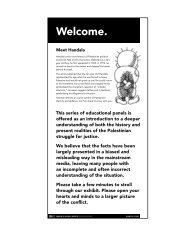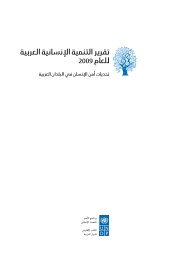arab human development report 2003 - Palestine Remembered
arab human development report 2003 - Palestine Remembered
arab human development report 2003 - Palestine Remembered
- No tags were found...
You also want an ePaper? Increase the reach of your titles
YUMPU automatically turns print PDFs into web optimized ePapers that Google loves.
interrelated issues in some depth. Some ofthese pertain to education, the media, the infrastructureof communication and informationnetworks, the production andmeasurement of knowledge and the organisationalcontext for its acquisition in Arabcountries. The societal and political contextimpacting on knowledge and the reciprocallinks between the knowledge society andeconomic and societal structures are alsodiscussed.The Report points out that deficientknowledge capabilities represent a formidableimpediment for Arab countries in theirattempts to face the challenges of the 21stcentury. These countries cannot make anytangible progress in the long term withoutacquiring the knowledge and the technologicalcapacities that are indispensable forprosperity in the new millennium. Indeed,the absence of such prerequisites could wellinvite unforeseen disasters. Ingraining andembedding knowledge in Arab societies isthe crux of any attempt to resolve the<strong>human</strong> <strong>development</strong> crisis in the region.Knowledge is one of the key instruments of<strong>human</strong> <strong>development</strong>, be it in institutinggood governance, guaranteeing health, producingthe ingredients of material and moralwelfare, or promoting economic growth. Assuch, knowledge is a vital factor of modernproduction and an essential determinant ofproductivity and competitive capacity.The Report presents a vision for instituting<strong>human</strong> <strong>development</strong> and unleashing societalcreativity; a vision that aims atreforming the societal context of knowledgeacquisition and consolidating the knowledgeacquisition system in order to move theregion towards a knowledge-based society.It argues that Arab countries have tremendouspotential for developing their knowledgecapacity in view of their – stillunutilised - <strong>human</strong> capital, and their culturaland linguistic heritage. Its vision forliberating this <strong>human</strong> capital and institutinga <strong>human</strong> renaissance across the Arab worldrests on five crucial pillars elaborated in itsconcluding chapter.In co-sponsoring this Report, the ArabFund for Economic and SocialDevelopment and UNDP seek to promote adebate on key questions of knowledge, tohelp diagnose some of the major challengesfacing the Arab states in this area, and to putforward suggestions on ways to achieve anArab renaissance and consolidate the acquisitionand employment of knowledge acrossthe Arab world. It is hoped that Arab countrieswill pay close attention to the methodsfor improving and accelerating the diffusion,production and application of knowledgein all economic, social and politicalfields; and for raising the level of Arab<strong>human</strong> <strong>development</strong>. We are confident thatArab countries have all the means requiredto achieve this end.In closing, I wish to extend my sincerethanks to all those who have contributed to,and taken part in the preparation of thisReport, and to our partner, UNDP, for commissioningit and overseeing its publicationin this distinguished form.Abdel Latif Youseff El HamedDirector General / Chairman of the Board of DirectorsArab Fund for Economic and Social DevelopmentVI







